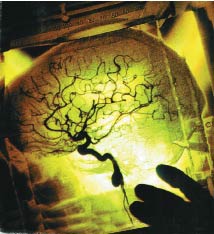 |
Time magazine carried an article called "Your Mind, Your Body" in its February 17, 2003, edition. It was suggested that the Cartesian separation of mind and body no longer applies, and that psychologists and neurologists are now agreed that mind and body are interconnected. The claims in this article, written by Michael L. Lemonick, consist of nothing but deceptions. All Lemonick does is to set out his own materialist fantasies, though he is unable to offer a shred of scientific evidence to back them up.
Lemonick maintains that the thoughts and emotions that color our reality are the result of complicated electrochemical effects taking place within and among the nerve cells. As evidence for these claims, he suggests that the feelings of low self-esteem and self-hatred that appear in schizophrenia and depression have nothing to do with reality, but rather consist of faults in the electrochemical system in the brain.
Lemonick's interpretation, which makes the mind and body one, is nothing more than a dogmatic claim lacking any kind of scientific and rational foundation. Even today the materialists' mind-body problem has not been solved. In other words, the question of how consciousness (the state of a person's having knowledge of, understanding, thinking about, interpreting, and feeling his surroundings and himself) could have come about in a piece of flesh like the brain has not yet been resolved.
According to materialists, consciousness is the result of electrochemical reactions in the brain. In other words, consciousness comes about with the chemical and electrical exchanges between the cells that make up the tissue of the brain. The fact is, however, that there is no scientific foundation for this claim. Not even the most highly advanced MR brain scans have been able to establish where consciousness is located in the brain, nor which chain of brain functions comprise it. All the scientific research carried out throughout the twentieth century in order to explain the phenomenon of consciousness shows that consciousness has no material base.
Such a conclusion is inevitable. Matter has no ability or essence within itself that could give rise to consciousness. All things considered, the brain cells that are believed to be the source of consciousness consist of nothing but unconscious atoms. How is it that a grey, damp piece of flesh made up of such atoms is able to create the very different characters of billions of different people? How do carbon, oxygen, and hydrogen atoms know how to arrange our bodies and emotions?
 |
Materialist philosophers can never explain the source of human consciousness. In order not to accept the fact that there is a being beyond the material world, they attempt to reduce human intelligence to matter. |
In fact, consciousness is an extraordinary property, and one that cannot be explained in terms of matter. Consciousness is literally a miracle.
Julian Huxley, an evolutionist who spent years trying to establish a materialist foundation for consciousness, admits his failure in these terms:
How it is that anything so remarkable as a state of consciousness comes about as a result of irritating nerve tissue, is just as unaccountable as the appearance of the Djin, when Aladdin rubbed his lamp…1
Of course brain damage can affect behavior. The chemicals people take can affect their characters. The symptoms of schizophrenia or depression can be observed in the brain. That is because the soul, the true origin of consciousness, extends to the material world via the brain. However, saying that the chemistry of the brain influences behavior and that psychological diseases can be observed in the brain, is not sufficient to resolve the mind-body problem. Colin McGinn, author of the book The Problem of Consciousness, makes the following confession on the subject:
We have been trying for a long time to solve the mind-body problem. It has stubbornly resisted our best efforts. The mystery persists. I think the time has come to admit candidly that we cannot solve the mystery.2
The claim made in Time magazine expresses nothing more than Lemonick's own personal and ideological fantasies. For Lemonick and other materialists, the mind-body problem is incapable of solution.
They said, "Glory be to You! We have no knowledge except what You have taught us. You are the All-Knowing, the All-Wise." (Qur'an, 2:32)
1 T. H. Huxley, Lessons in Elementary Psychology, p. 210
2 Colin McGinn, "Can We Solve the Mind-Body Problem?" Mind, 98 (1989), p. 349